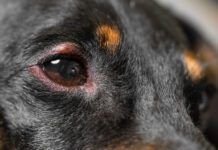In the relationship between cancer and nutrition, there are few conclusive answers. The modalities of both are complex, and neither is completely understood.
However, enhanced nutrition is of unquestionable benefit to any dog with cancer, and to any dog with an increased risk of developing cancer. And of the many known factors leading to canine cancer, proper nutrition is the one which dog owners can best control, enhancing a dog’s overall health, and improving the body’s natural defense against cancer. Plus, when cancer strikes, there are sensible nutritional guidelines (based on the best available evidence) that seem to help many dogs, improving the response to both radiation and chemotherapy, lessening the side-effects, and giving dogs the strength to extend their lives.
Caution Needed
Those positive words must be followed with some cautions. Cancer diets often emphasize or restrict certain nutrients, in order to promote certain biochemical actions or to thwart others. But nutrition is a whole-body dynamic. A diet can be effective, ineffective, or, worst of all, actually harmful for a dog based on the type and progression of cancer, the dog’s overall health, and almost certainly, nutritional variables which have not yet even been identified.
In short, anyone contemplating a nutritional response to cancer – in particular, an all-or-nothing response, in lieu of conventional treatment – needs professional advice of the highest order available.
So, while we will discuss the best-understood and most promising advances in the science and art of treating or preventing cancer through nutrition, we must stress that the following information should not be regarded as a prescription for any individual dog. Rather, we intend for people who have dogs with cancer, or dogs which are genetically predisposed to cancer, to use this article as the basis for a detailed and individualized conversation with their veterinarians, who will have to conduct lab tests to help tailor a diet to any individual’s needs.
We’ll warn you now: It might be difficult to find qualified veterinarians who offer hands-on nutritional consultations. Lacking immediate access to such experts, and facing a beloved dog suffering from cancer, dog owners are often tempted to embark on a crash course in canine nutrition, and start supplementing their dogs with anything they’ve heard good things about; this can be more dangerous to the dog’s health than cancer. Nutritional intervention can help cancer-stricken dogs, but we can never know the complete clinical picture without the help of a veterinarian and access to chemistry profiles.
To be blunt: In the hands of an expert, nutrition can save your dog’s life. In the hands of an amateur, nutrition could end it.
Of course, we’re being deliberately cautious. To be truthful, if you altered a dog’s diet strictly through the use or restriction of commonly used foods, never supplementing the diet with any oils, powders, vitamins, minerals, herbs, or other additives, you probably couldn’t do any harm. But experienced veterinary experts all have a tale or two to relate regarding someone who supplemented their dog’s diet with several things they had heard good things about, never realizing that the dog’s basic diet already contained sufficient amounts of the same nutritional components, and ended up giving their dog a toxic overdose of those nutrients.
Theories Behind Nutritional Treatments for Cancer
Food consists of macro-nutrients (protein, carbohydrates and fat) and micro-nutrients (vitamins and trace minerals). A dog’s immune status, at any given time, reflects the overall quality of those nutrients; the two ebb and flow in a complex biochemical partnership. While the specific parameters of that partnership are not yet completely understood, in general, when their relationship is optimum, they work effectively to support a healthy immune system. A properly functioning immune system, in turn, is what stops cancer even as it starts.
Poor nutrition, on the other hand, can lead to compromised immunity, in turn resulting in a diminished physical state in which a cancer can take hold, overwhelming a dog’s natural defenses.
It should be noted at the outset that the recommended cancer-fighting diets differ significantly from diets formulated to prevent cancer. While the components of the two diets are largely the same, the proportions change as a result of the way that cancer acquires the energy to survive.
Cancer-fighting diets take advantage of the fact that cancer cells thrive on simple carbohydrates like sugars, starches and grains, and cannot easily utilize fats. The premise of current theory, then, restricts carbohydrates – depriving the cancer cells of easy sources of energy and slowing their growth – while supplementing the fats found in meat with unique molecular structures known as omega-3 fatty acids, which support the dog’s overall energy needs. This is crucial inasmuch as cancer hijacks much of the energy provided by carbohydrates and proteins. Because cancer diverts energy from metabolized protein and carbohydrates, the cancer-stricken dog must subsist to an abnormal degree on stored fat or fat introduced into the diet.
Feed the Dog, Starve the Cancer
Cancer thrives on simple carbohydrates, particularly in the form of glucose, to the extent that metabolized dietary carbohydrates can represent a net energy loss to the dog – the cancer, not the dog, derives the greatest share of nutritional benefit from carbohydrates.
Similarly, the way that cancerous dogs metabolize protein causes amino acid imbalances which benefit cancer more than the canine host. The resulting progressive loss of strength and energy can be a critical factor in survival. Protein, at the most visible level, supports muscle mass, and its depletion saps crucial strength.
While carbohydrates can safely be limited in the short term (the cancer-arresting time frame) protein cannot be restricted for any amount of time, but should be provided in the highest available quality. Research suggests that early correction of cancer-caused amino acid imbalances (in particular arginine and glutamine) leaves dogs better able to survive.
Cancer and Wasting
Weight loss is a serious complication in the majority of canine malignancies. Energy acquisitive by nature, cancer alters many of the processes of a dog’s metabolism, resulting in what is called cachexia, a wasting syndrome occurring in spite of what would otherwise be a nutritionally adequate diet. Cachexia plays a critical role in dog’s ability to survive, not only in robbing the body of nutrients, but also because a malnourished dog cannot fully process many cancer-fighting medications, hence suffering both a diminished quality of life and diminished life expectancy.
It is now known that cancer significantly alters the dog’s normal metabolism at the outset of cancer growth, long before the disease may be detected through visible symptoms. This is emphasized by Dr. Gregory K. Ogilvie, a leading veterinary oncologist who bases his research and practice at Colorado State University. “Our research shows that these abnormalities exist regardless of the type of cancer a dog has, and whether a tumor is one centimeter in size or twenty centimeters,” he says. “We need to train veterinarians and dog owners that nutritional intervention should begin before cachexia becomes evident. The earlier the intervention, the better the outcome. If you wait until phase 3 (the final stage of cachexia, in which weight and strength begin to plummet) you’re in trouble.”
Other Considerations
In addition to the factors mentioned above, the following should be taken into account when planning a diet for a dog with cancer:
• Macro-nutrient ratio: Protein and fat are the mainstays of the cancer diet. The typical ratio suggested by most veterinary oncologists, is roughly 50 percent fat, 40 percent protein, 10 percent carbohydrates. However, these figures will vary depending on individual circumstances, and are likely to need ongoing adjustment, as a dog responds or fails to respond to the diet, and/or other clinical interventions underway.
• Individualization: Each dog is unique. Digestive and glandular patterns are known to vary. Diets should take into account such variables as size, breed, bone structure, reproductive status, energy level, type of coat, local climate, and current cancer status. What is nutritionally sound for one cancer patient may be inadequate, or even harmful, for another. “Each patient needs to be accessed by a veterinarian,” says Dr. Ogilvie. “There are often other concurrent diseases playing a nutritional role.”
• Monitoring weight: There is likely to be a fine nutritional line between cancer control and overall nutritional needs. While weight loss is almost certain (for obese dogs, controlled weight loss can be beneficial), a steady downward trend means the diet is inadequate and needs adjustment. It is important to realize that, for any given dog, there is a point where weight loss alone can be the immediate critical factor in survival, and extremely difficult to reverse.
• Keeping the Cancer Dog Eating: The most sophisticated cancer diet in the world is worthless if a dog won’t eat it. New diets should be introduced gradually, modulated by the dog’s ongoing reaction to the change. Owners of finicky eaters will already know what works in terms of canine “manipulation” (adding small treats, adjusting the presentation, smell, temperature, etc.), but, fortunately, the presence of fresh meat in the diet is likely to be a convincing factor for most dogs. Dr. Ogilvie suggests feeding fresh, aromatic foods that have been warmed to the dog’s body temperature.
Improved nutrition has long been a mainstay of holistic cancer practice. If your dog has cancer, a fresh-food diet, carefully formulated with the help of an experienced veterinary nutrition expert, is the best option. When providing this diet isn’t possible, using the Hill’s Prescription n/d food appears to be an excellent second choice. Either way, your dog will have a diet which supports him in his battle with cancer, instead of helping the disease progress.
Roger Govier, a freelance writer and a frequent contributor to WDJ, lives in San Francisco.






Is brown rice or white rice better for my Golden retriever who was just diagnosed with cancer?